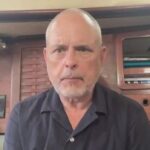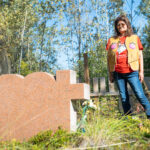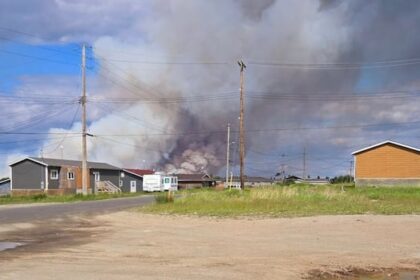British Columbia·NewWhy has this long-debated project not come to fruition?Dollars have been a factor, but so are regional priorities and peculiarities Justin McElroy · CBC News · Posted: Oct 14, 2025 10:00 AM EDT | Last Updated: 30 minutes agoPeople are pictured waiting to board the Skytrain in Vancouver in April 2023. (Justine Boulin/CBC)The year was 2008. The premier was Gordon Campbell. And for the first time, funding had been committed for a project that University of British Columbia students crammed into the 99 bus line had long hoped for. “Just imagine just taking the SkyTrain all the way to UBC,” said then-Vancouver mayor Sam Sullivan, after Campbell announced a $14-billion transit plan that would include an Evergreen Line to Coquitlam, an extension of the Expo Line into Surrey’s suburbs, modified rapid transit to Langley City — and an extension of the Millennium Line to UBC. “UBC students spend so much time in transit and waiting for transit … wouldn’t it be great to change that?”Seventeen years later, UBC students are still spending time in transit. While TransLink’s four busiest bus routes all end at the university, the Millennium Line extension under construction will end at Arbutus Street, 6.7 kilometres from campus. This week, Vancouver council unanimously passed a motion calling on the province to accelerate planning and funding for an extension, following a rally by UBC students earlier this month.“It’s a win-win-win. We should get on with it and invest the capital now,” said OneCity Coun. Lucy Maloney, who brought forward the motion. But the fact that this conversation continues 17 years after it first became government policy begs the question — why has this long-debated project not come to fruition?WATCH | Students say SkyTrain is still too far from UBC campus:Students, city councillors call on government to build UBC SkyTrain extensionUniversity of British Columbia students are calling on the federal and provincial governments to build a SkyTrain extension to connect the university to the rest of the Lower Mainland. They say the latest SkyTrain extension is still too far from campus.Regional issuesOne reason is the complex mix of regional priorities for increasing transit options in Metro Vancouver, with politicians from different municipalities each advocating for their own projects.“I find it very tone deaf when you consider the number of SkyTrain stations … in places like Vancouver and Burnaby have already received, when the vast majority of growth in our region is actually taking place south of the Fraser River,” said Delta Coun. Dylan Kruger, who is currently pushing for better dedicated routes linking Delta’s three urban areas of Ladner, Tsawwassen and North Delta. Such sentiment was one of the reasons the Mayors’ Council 10-year plan in 2014 only prioritized a Millennium Line extension to Arbutus, rather than all the way to UBC, leaving more funds for transit elsewhere in the region. And in 2023, when a new plan was created, the UBC extension was only listed as a priority “after the North Shore Rapid Transit and [Bus Rapid Transit] Action Plan have already begun implementation.” Local issuesThe B.C. government took over leadership for the UBC extension in 2022, which might change the regional calculus for the project going forward. But the only directly-elected regional politician for the UBC campus and community admits there are local factors that make an extension different than a flat route connecting one municipality to the other.�“There’s a long history with UBC that complicates some of the discussions around the region,” said Jen McCutcheon, Metro Vancouver’s Electoral Area director for the UBC area, which has no local government. “But fishing this line is an important part not just for UBC residents, but for residents from as far away as Langley … it’s a really important part of connecting the whole region.”UBC’s reluctance to commit funding to any project — for years, they only offered land — was a factor in the slow pace of discussions over the years. While the university eventually committed $100 million to the project in 2019, and began jointly lobbying the province with the City of Vancouver and local First Nations, the pandemic put further talks on the backburner. And while UBC students have long endorsed a rapid transit extension, the same interest isn’t there for the regions it would pass through.“Residents matter, which seems to be glossed over so much of the time. People enjoy living where they’re living and are not excited about being displaced,” said former Vancouver city councillor and mayoral candidate Colleen Hardwick.Neighbourhood associations in West Point Grey and Kitsilano have long been skeptical of a line, and Hardwick promised a fierce campaign should it be developed further. MoneyBeyond local and regional considerations, there’s the almighty dollar. In 2019, the budget for the extension to Arbutus was estimated at between $3.3 billion and $3.8 billion, but is expected to be higher today due to inflation and increased construction costs for projects across the province. When asked for comment about the current campaign for a UBC extension, the Ministry of Transportation would only say that planning, “including extensive regional coordination and technical studies, is underway.”Add it up, and there are plenty of reasons why plans for a UBC extension are almost as old as many first-year UBC students — with no guarantee of a change anytime soon.“I think we need a bigger investment in public transportation. Is it going to come right now given the current economic situation?” said McCutcheon“I’m not sure. I’m not holding my breath, I guess.”ABOUT THE AUTHORJustin is the Municipal Affairs Reporter for CBC Vancouver, covering local political stories throughout British Columbia.
17 years and counting: Why plans for a rapid transit line to UBC have barely left the station











